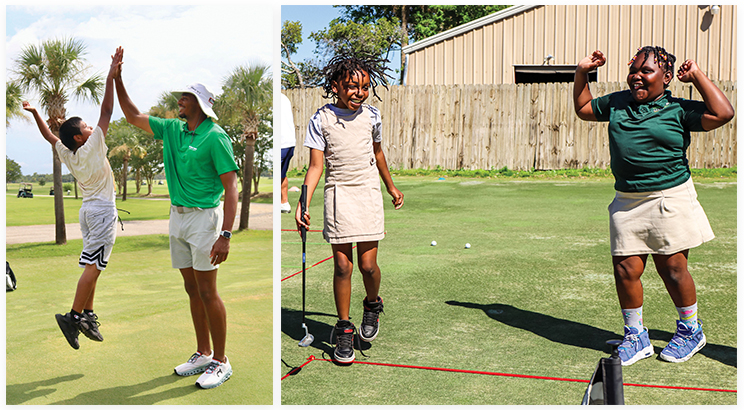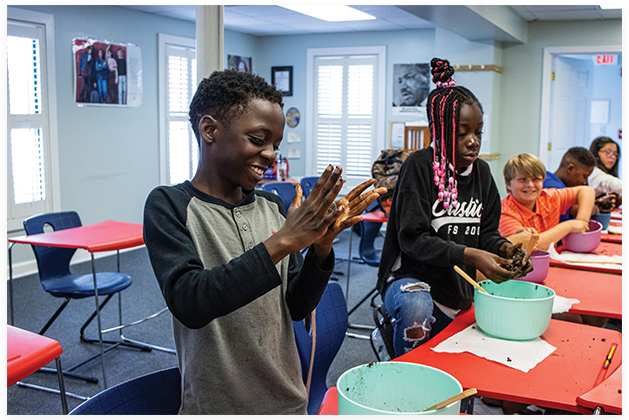
In the past year, First Tee Greater Charleston reached 17,975 children ages five to 18 in the tricounty area through programs at 35 elementary schools and classes held at eight golf courses.
During a recent First Tee Greater Charleston gathering at the municipal golf course, a buzzy group of seven- and eight-year-olds gathered around the tee, anxious to start playing a new-to-them sport. Before they began swinging, the volunteer coach slipped an important lesson into the moment. “To show my courtesy on an opening tee, I’m going to remove my cap, offer firm handshakes to the other players, look them in the eye, and introduce myself.”
Courtesy is one of nine core values that make up the First Tee game plan. “With every class, our coaches seamlessly integrate a golf skill, life skill, and core value,” says the nonprofit’s executive director Bucky Dudley. “Our curriculum helps kids build a toolbox for life while introducing them to a sport they can play for life.” Golf offers a unique mechanism for imparting life skills such as honesty, judgment, and perseverance: “You keep your own score, call penalties on yourself, and play the ball as it lies.” At the end of each class, the coach encourages participants to brainstorm ways to carry that day’s core value back to their homes and schools.
Last year, through on-course classes and in-school programs, First Tee Greater Charleston (FTGC) reached 17,975 tricounty children ages five to 18, but, Dudley says, “We’re not trying to create 17,975 golfers. Our primary objective isn’t access to the game but access to game-changing opportunities.” The nonprofit hosts regular after-school sessions on eight courses across the Lowcountry and has forged partnerships with teachers and administrators at 35 area elementary schools, most of which hold a Title 1 designation. The group’s trained coaches also offer community outreach for youth organizations like recreation centers and churches at no charge. And in the wake of the pandemic, FTGC arranged for any child (not just First Tee students) to play golf for free at five local courses, outfitting each location with a set of clubs for young players to borrow.

Since forming in 2008, FTGC has positioned its programs to reach a broad range of people. And its participants are as varied as the bars on a pair of plaid golf pants. “Sometimes, the perception is that we’re just targeting underserved kids,” says Dudley, “but we’re really serving kids from all walks of life. The goal is a shared experience. Kids can learn a lot from each other.” In recognition of FTGC’s efforts, First Tee’s international leaders selected the chapter as one of two recipients (among more than 150 in the world) of the 2022 Barbara A. Douglas and Dr. William J. Powell Diversity Award. The chapter’s Game Changers Immersion Program, created in 2021, served as a major driver of that decision.
This mentorship program follows nominated teens from middle school until high school graduation. Five days a week in the summer and every Saturday during the school year, the classes meet for golf instruction, meals, and enrichment activities such as etiquette lessons, financial literacy classes, culinary courses, STEM programs, college prep, career training, and more. “We welcome a new class of eight rising sixth graders each year,” explains Dudley. “At maturity, the program will host about 60 kids and potentially more if we can build out our infrastructure.” Looking down the fairway to the future, the executive director has his sights set on establishing a First Tee learning facility and expanding from their two buses to an entire fleet.

First Tee’s Game Changers Immersion Program follows teens from middle school to high school graduation, offering golf instruction, meals, and enrichment activities.
Now in its 15th year, FTGC operates on a yearly budget of $1.4 million, gaining funding through donations by local individuals and businesses, grants from USGA and Toro, and the Lowcountry Golf and Gala fundraiser. This popular annual golf tourney, dinner, and auction, to be held at Wild Dunes Resort on September 8, also provides FTGC a platform to share its topflight successes: for example, 67 percent of participant parents report seeing improved coping skills, and 70 percent of students have boosted their health and wellness. Ninety-three percent have shown greater confidence in their abilities and a willingness to try new things. “But our biggest impacts can’t be measured,” beams Dudley. It’s those hole-in-one moments, like when a formerly timid teen walks into a new situation, removes his hat, looks a new acquaintance in the eye, and shakes hands.